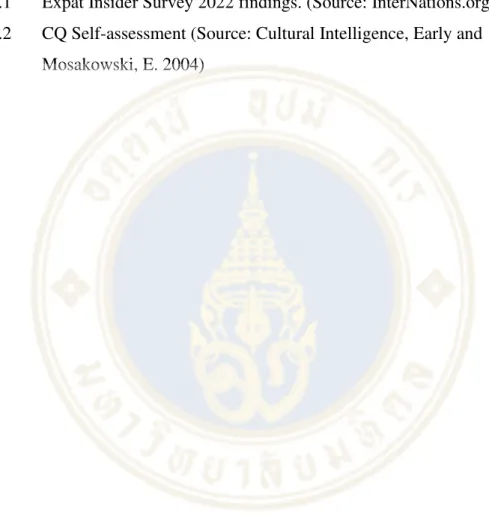The aim of the paper is to investigate the influence of cultural intelligence on the management of these challenging intercultural situations. Cultural intelligence theory (Early and Ang, 2003) will be used to support our observations.

LITERATURE REVIEW
A Growing Trend of Non-Thai living in Thailand
- Statistical reports on the increasing number of Expats and international students living in Thailand
- Reasons to move to Thailand and its attractiveness to Expats According to Expat Insider 2022 survey, including approximately 12,000
Nevertheless, Thailand ranks poorly in the "Expat essentials", "Quality of life" and "Working abroad" categories, ranking 18th, 35th and 45th respectively out of 52 countries. Apparently, at some point during their stay in the Kingdom, these categories caused difficulties for the survey participants to adjust.

The culture shock and its 4 stages by Oberg (1954)
In the opposite case, it can take longer or in the worst case cause the mental breakdown of the individual. Indeed, the structure of a language has a very strong connection with the behavior and culture of the people.
The Theory of Cultural Intelligence by Early and Ang
- Self-assessment Cultural Intelligence Test
In general, if the average stands at 4.5 or above, the score suggests that the individual possesses a high level of Cultural Intelligence. According to Cultural Intelligence Theory, a person endowed with cultural intelligence has strong adaptive skills, which facilitates. Meanwhile, for those with a lower level of cultural intelligence, this adjustment period can last up to months or even years, strongly affecting the individual's state of mind throughout the process.
To meet the expectations of this research, this self-assessment of Cultural Intelligence will be used in the interviews and each of the participants will reflect on their past experiences and give themselves a score for each of the skills. After each participant completes this self-assessment, they will be asked to justify their scores and explain their thoughts and reasons, as these self-assessment results will serve as a reference for their Cultural Intelligence levels for our research. Therefore, the results of the assessments will be useful to explore how the cultural intelligence levels of the participants may have an impact on the management of culture shock.
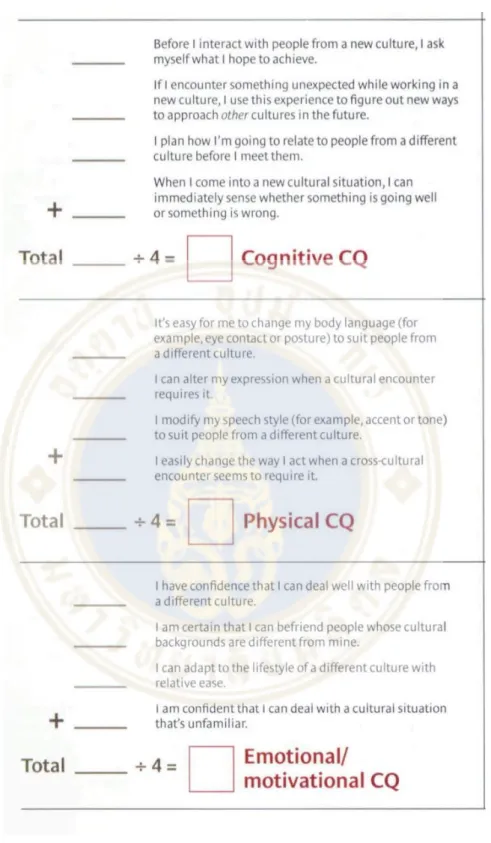
RESEARCH METHODOLOGY
- Research Design
- Data Collection
- In-depth interview
- A Cultural Intelligence Self-assessment
- Sample Selection
- Research Framework
Have you ever had to change or adapt your behavior/manners to please Thai people or fit into their society. Second, in order to complete our data collection set, participants will be given a self-assessment test (see Figure 3 from the literature review) and will be asked to reflect on and evaluate their Cultural Intelligence abilities. In our data analysis section, both this self-assessment and the in-depth interview will be connected to explore the impact of the Cultural Intelligence of participants on managing their Culture Shocks and cross-cultural experiences.
In other words, individuals with a high level of cultural intelligence will adapt more easily to any cross-cultural situation than individuals with a lower level of cultural intelligence. After answering relevant questions about their cultural experiences in Thailand, all participants will complete a cultural intelligence self-assessment. Both interview responses and self-report scores will be used to examine the impact of cultural intelligence levels on their culture shock and cross-cultural experiences in Thailand.
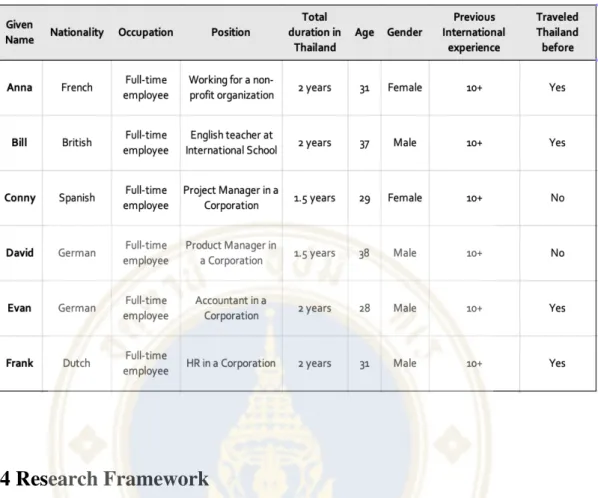
DATA ANALYSIS
The participants ’ International experience s
- Anna
- Bill
- Conny
- David
- Evan
- Frank
Bill has been an English teacher at an international school in Bangkok for 2 years. But since he started his professional career, he has always lived abroad, as that is what he likes the most. So he decided to look for different opportunities abroad within the company and ended up in Thailand.
He said the company's culture and principles can be seen in every country in the world he's lived in, but it's true that the people on the teams are different. He was born in the Netherlands, and although half of his family is from Morocco, he has only been there to travel in the summer. He has always traveled all over the globe with a special focus on Asian countries, he mentioned that he has traveled absolutely every country in Southeast Asia.
Cultural Intelligence Self-assessment results
Among the three abilities that define cultural intelligence (Early and Ang, 2003), behavioral ability achieved the highest mean score at 4.25 out of 5, followed by emotional/motivational ability at 3.83. The average overall cultural intelligence score is 3.96 (almost 4) out of 5, indicating that participants' levels of cultural intelligence are generally relatively high. Anna was ranked first as her reflection scored an outstanding 4.67 out of 5.
David and Bill's scores are above 4, suggesting that their cultural intelligence is also higher in their opinion. To fully understand the reasons behind these results, in the following paragraphs, the reflections of the participants while conducting the assessment will be exposed and analyzed in detail by the three capacities that define the concept of cultural intelligence: Cognition (cognition and metacognition) , Motivation and behavior.
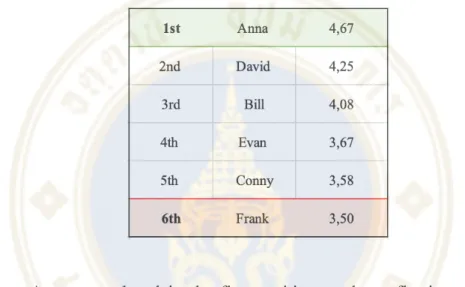
Cognition
- Collectivism
- Hierarchy
- Relationship with time
- Communication
- The analysis of Cognitive Cultural Intelligence
In the workplace, Conny also confirms her team is very supportive in Thailand “They are very comfortable and like to work together for the company and have a strong team spirit and like to check with other team members when they have questions. All Conny, David and Evan expressed their strong concern about the lack of environmental awareness in Thailand. According to one of our participants, punctuality is not given the same relevance in Thailand as in Germany.
He added that now that he has been in Thailand for a while, he knows that it is a cultural thing, as he has been able to observe and see that Thai people live very slowly and are rarely stressed to be on time at any meetings. I like to tell my family and friends that I love them, it makes me happy." But she feels that in Thailand it is slightly different, people don't tend to express their feelings and their body language signs reflect that they don't feel comfortable "They always seem to be smiling and happy, no worries." He planned to gain a deeper understanding of Thai culture after spending a few months in Thailand.
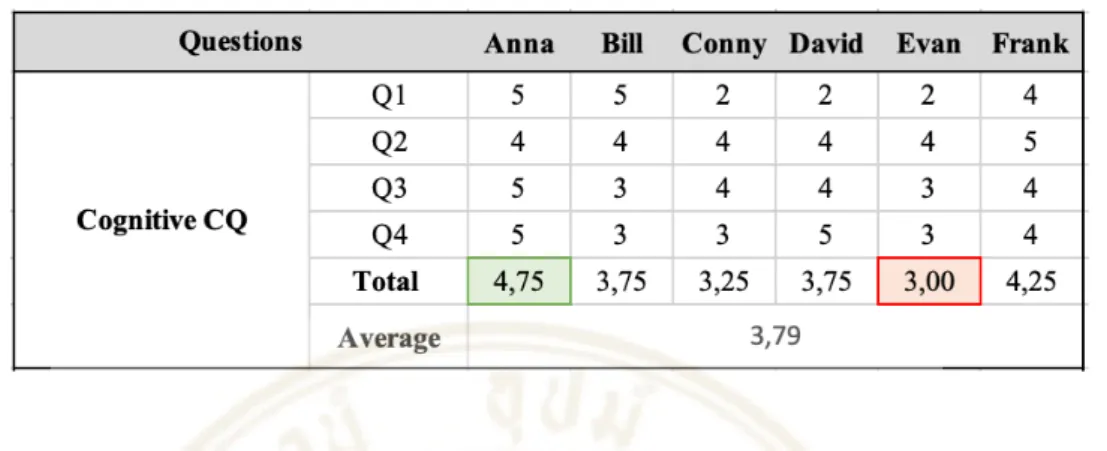
Motivation
He gave himself 4.25 because he has always had excellent relationships with people from all over the world in the past, and he considers himself an open-minded person who enjoys human exchanges and learning from other people's ways of thinking in cross-cultural encounters. Bill's motivational cultural intelligence level is probably a key factor of his success in Thailand, as he mentioned several times in the interview "I love my job here, I love teaching Thai students". David gave himself a perfect score for motivational Cultural Intelligence, arguing that he feels so comfortable in the country that he never experienced a mental breakdown or a strong need to return to Europe in this year and a not half
In the interview, he mentioned that he is extremely grateful that the company gave him the opportunity to lead the Thai team, because now he can experience different situations at work every day, which is really exciting for him as a dynamic person. As reflected in the ranking for this ability, his motivation level is relatively low compared to the other participants. He mentioned that he no longer feels strongly motivated to live up to his score and that he mainly moved to Thailand to be physically close to his girlfriend, and currently they don't even live in the same city.

Behavior
In an interview, Frank admitted that he often felt homesick and that he thought about returning home a few times. She mentioned that she feels compelled to wear masks in the office "Everyone wears masks, so I think I should do the same". In the interview, he emphasized how he adjusted the tone and volume of his speech, especially at work, so as not to disturb his teammates.
He claims that he has also adjusted his behavior, especially when he is in the office. Moreover, he admitted that he needs to learn how to find a balance when making jokes "I'm kind of a clown and I enjoy making people laugh wherever I go, but once I confused the company. There was a boy and a girl in the office who liked each other, and every time the girl turned up, I would tease the guy and say 'there's your future girlfriend'.
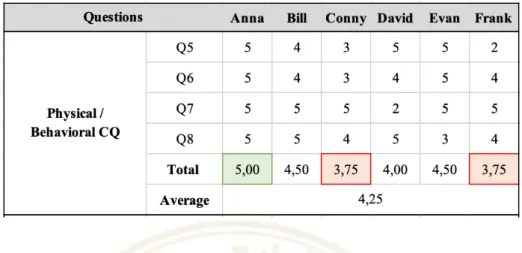
The impact of Cultural Intelligence in the management of Culture Shock
He argues that he can perfectly change his ways or even change his daily behavior to adapt to any cultural situation. She just needed to physically feel the support of her family and recharge her emotional energy. On Frank's part, he mentioned that he still often suffers from nostalgia and has considered returning to the Netherlands several times.
However, he tries to motivate himself every day by focusing on his professional career and the fact that he is currently closer to his girlfriend than if he were in Europe. Another source of motivation was focusing on his future plans, such as moving in with his girlfriend soon and moving to Europe together in the next few years, so that he can finally be closer to his family. He also said that whenever he feels nostalgic, watching videos about his neighborhood in the Netherlands would help him recover as fond childhood memories come to his mind.
CONCLUSIONS AND RECOMMENDATIONS
Conclusions
In summary, the self-assessed level of cultural intelligence of all participants, together with their reflections and experiences shared in the interviews, allowed us to explore their ability to adapt to a different culture. In fact, the overall data collected shows that they all seem to have the ability to adapt to situations in another culture, as they gave specific examples of everyday problems they face in Thailand and how they gradually overcame them. Anna, Bill, David, and Evan appear to have low stress levels during the culture shock period, while Conny and Frank's stress levels appear to be higher.
Both Conny and Frank mentioned that they had a mental breakdown and a desperate feeling to go home, which especially justifies their self-assessed low scores in Motivational Cultural Intelligence capacity. However, they mentioned that they have now relatively recovered and feel that they can stay in the Kingdom for a few more years. Therefore, although some of them really struggled at one time, it seems, from their statements, in the end that today they have all managed to adapt successfully to living in Thailand.
Advice for Expats
Limitations of the Research
